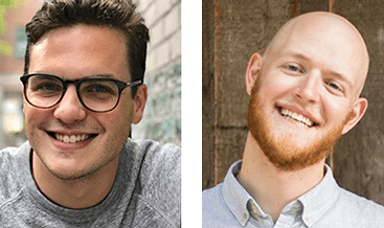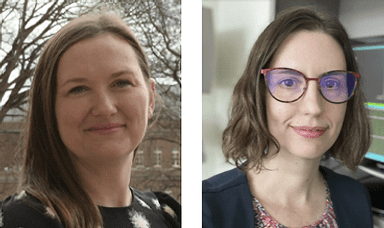Sara Cullinan, PhD, Director of Scientific Publications

Many ASHG members are familiar with the Cotterman Award, an honor bestowed each year to the trainee authors whose work published in The American Journal of Human Genetics (AJHG) is noted for exceptional quality. This year, Human Genetics and Genomics Advances (HGG Advances) introduced the Early-Career Investigator Award to recognize the top contributions from authors who have recently embarked upon their independent careers. The two awards highlight the commitment of the ASHG journals to supporting career development of the Society’s youngest members. Each winning author receives $1,000, along with recognition and high visibility at the annual meeting.
This year’s award-winning work spans a range of topics—from evaluating the utility of high-throughput assays in classifying variants of uncertain significance (VUSs) to establishing best practices in cross-ancestry analyses. Behind every paper lies a scientist whose curiosity and dedication drive discovery, and we recently caught up with this year’s winners to learn more about their experience publishing with the ASHG journals.

This year’s Cotterman awardees both commented on the importance of finding the right fit for their work. “We felt that AJHG would be the ideal journal to showcase our results which came from numerous methods, datasets, and human populations. The reviewers were fair, but rigorous, and the dialogue that we had with them resulted in a much more robust set of analyses, adding invaluable content to the final manuscript,” noted Sam Smith, PhD, who recently completed his doctoral studies at Brown University. Similarly, Shawn Fayer, MS, CGC, a genetic counselor and University of Washington graduate student said that, “AJHG has been a home for many recent papers featuring high quality multiplexed functional assays, so it felt like the right fit for our analysis of clinical utility of these assays. We had a wonderful experience publishing with AJHG. The reviews were prompt and very reasonable. I feel the reviewer’s suggestions improved the manuscript overall. After publication, it was wonderful to see our paper featured by the official AJHG Twitter account.”
Likewise, the winners of the inaugural Early-Career Investigator Awards felt that HGG Advances provided an ideal home for their work. Lindsay Fernandez-Rhodes, PhD, an assistant professor at Penn State University said that she “had a really positive experience working with HGG Advances for the first time as part of this manuscript. As an ASHG member, I was able to publish our work as open access for a discounted rate. Given that our manuscript focused on an under-represented population in the genome-wide association study (GWAS) literature, we wanted our work to be immediately accessible to all. HGG Advances helped us reach this goal.” Heather Wheeler, PhD, an Associate Professor at the University of Chicago, noted that “the editors were truly helpful in improving our paper. It was great to know researchers affiliated with ASHG would be handling our paper. We initially submitted our paper to AJHG and, while it was not a good fit for AJHG, we had the opportunity to immediately transfer our submission to HGG Advances. Within a week of the transfer, the associate editor at HGG Advances got back to us with suggestions for how to improve our work before sending it out for peer review. We took the editor’s advice and spent a couple months revising our paper and then submitted a stronger paper that went through submission, one round of peer review, and acceptance in 4 months, which is fantastic!“
This inspiring group of young scientists also shared some advice for their peers; the importance of resilience and collaboration were common themes. As Lindsay noted, “The manuscript associated with this award was a project that took many years to coalesce, even when led by a stellar team of established and young scientists alike. I would encourage other young investigators with a passion for justice, equity, diversity, and inclusion to not get discouraged when their work takes longer to be published or garner attention. Building the resources, collaborations, or methods necessary to support a more diverse and inclusive field will all take time, but this work will reap immense societal benefits for years to come.” Heather encouraged young investigators to engage in leadership roles. “Use your network developed in grad school and as a postdoc to make connections with new potential collaborators. Lead projects, rather than following others. If the project is too big to lead, start a smaller project you can own as corresponding author.”
The Cotterman awardees also reflected upon the benefits of seeing a project through to completion. Sam noted that, “the process of designing, implementing, and publishing work requires a lot of personal investment. It can often feel like entering a tunnel and finding yourself unable to see the light at either end. However, continued investment in your interests will help propel the process forward, and there is no feeling like seeing a manuscript through until the end!” And as Shawn commented, although awards are nice, the work itself is the true motivator. “At the end of the day, we would have been proud of the work regardless of any awards, and I think that is what really matters.”
Be sure to renew your ASHG membership if you, or one of your trainees, would like to be considered for next year’s HGG Advances Early-Career Investigator or Cotterman awards.
